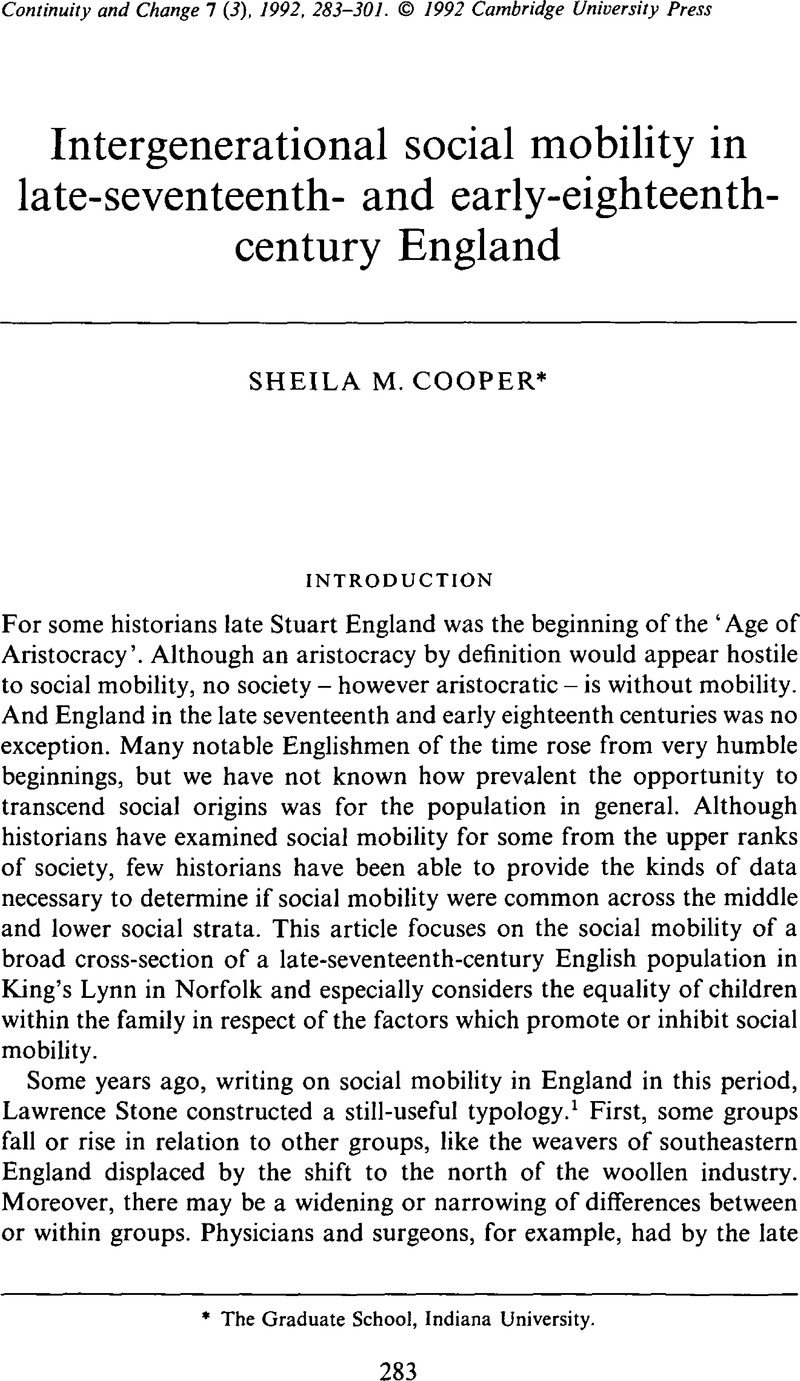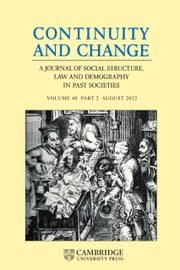Article contents
Intergenerational social mobility in late-seventeenth- and early-eighteenth-century England
Published online by Cambridge University Press: 11 November 2008
Abstract

- Type
- Articles
- Information
- Copyright
- Copyright © Cambridge University Press 1992
References
ENDNOTES
1 Stone, Lawrence, ‘Social mobility in England, 1500–1700’, Past and Present 33 (1966), 16–55CrossRefGoogle Scholar. Also in Seaver, Paul S., Seventeenth-century England: society in an age of revolution, 26–70, esp. pp. 32–3 (New York, 1976).Google Scholar
2 King, Lester Snow, The medical world of the eighteenth century (Chicago, 1958), esp. chapter 1.Google Scholar
3 Lipset, Seymour M. and Zetterbury, Hans L., ‘A theory of social mobility’, in Bendix, Reinhard and Lipset, Seymour M. eds., Class, status, and power: social stratification in comparative perspective (New York, 1966), 565.Google Scholar
4 See Goldhamer, Herbert, ‘Social mobility’, in Sills, David L. ed., International encyclopedia of the social sciences 14 (New York, 1968), 429–38, esp. p. 433.Google Scholar
5 Wrigley, E. A. and Schofield, R. S., The population history of England, 1541–1871: a reconstruction (London, 1981), 234–6, 255.Google Scholar
6 Stone, , ‘Social mobility’, 34–5.Google Scholar
7 There is a multitude of studies which reflect the growing specialization within occupations. See for example Westerfield, R. B., ‘Middlemen in English business, particularly between 1660 and 1760’, Transactions of the Connecticut Academy of Sciences 19 (1915), 111–445Google Scholar. Also Patten, John, ‘Urban occupations in pre-industrial England’, Transactions of the Institute of British Geographers, New Series 2 (1977)CrossRefGoogle Scholar, Change in the town, and Cooper, Sheila M., ‘Family, household, and occupation in preindustrial England: King's Lynn, 1689–1702’ (unpublished Ph.D. thesis, Indiana University, 1985), 156–63.Google Scholar
8 Laslett, Peter and Harrison, John, ‘Clayworth and Cogenhoe’, in Bell, H. E. and Olland, R. L. eds., Historical essays, 1600–1750 (New York, 1963), 157–84Google Scholar, and Souden, David C., ‘Pre-industrial English local migration fields’, unpublished Ph.D. thesis (University of Cambridge, 1981), 313–15, 320Google Scholar, see also figure 2.12, pp. 141–2.Google Scholar
9 will of Prettyman, Mary, Norfolk Record Office (hereafter NRO), ANW vol. 70 (1962), MF/313.Google Scholar
10 will of Drinkmilcke, Sarah, NRO, ANW vol. 69 (1690/91), MF/312.Google Scholar
11 SirStephen, Leslie and SirLee, Sidney eds., The dictionary of national biography, vol. 20 (London, 1889), 96–7.Google Scholar
12 Scammell, G. V., ‘Manning the English merchant service in the sixteenth century’, The Mariner's Mirror 56 (1970), 131–54.CrossRefGoogle Scholar
13 Public Record Office (hereafter PRO), E 182/687.
14 For a more comprehensive list of pertinent documents and their reference numbers in the NRO, PRO, and the King's Lynn Archives (hereafter KLA) see Cooper, , ‘Family, household, and occupation’, esp. pp. 23–32.Google Scholar
15 Aristotle, ‘Polities’ (Book IV, 11), in Barnes, Jonathan ed., The complete works of Aristotle, vol. 2 (Princeton, 1984), 2056.Google Scholar
16 King, Gregory, ‘National and political observations and conclusions upon the state and condition of England, 1696’, in Laslett, Peter ed., The earliest classics: John Graunt and Gregory King (London: 1973), 48.Google Scholar
17 Occupation almost invariably formed part of a male's ‘address’, the other part being his name. In legal records, in incidental hall book entries, and sometimes in parish registers, he would be listed as ‘Henry Bell, mercer’ or ‘Robert Whitehead, tobacco-pipemaker’. The most common exceptions occurred when title or rank replaced occupation, e.g., ‘Charles Turner, gent.’ superseded ‘Charles Turner, attorney’.
18 There were many gradations within occupations. Mariners, for example, ranged from the lowliest seamen to the master mariners who owned several vessels. Similarly, an alehouse keeper could have been barely surviving economically in small, rented quarters or could have owned several establishments with water piped in. Nonetheless, while the appellation stood, no mariner or alehouse keeper ranked with a labourer on the one hand or a merchant on the other.
19 The standard regression equation for such an analysis would be Y = α.+ β1X 1+ β2X 2+ β3X 3 …+e, where Y is the dependent variable; β the weight given to X, an independent variable, and e the error term. If sufficient data were available, we would be able to read the equation as social level of child's occupation = a common value + the weight (or influence) of parent's occupation + that of wealth + that of sibling mortality, etc., + an unexplained residual.
20 Borough chamberlains' accounts (1689), KLA, KL/C39/107.Google Scholar
21 will of Roe, Robert, NRO, ANW vol. 71 (1694), MF/314Google Scholar; will of Francis Slater, NRO, ANW vol. 72 (1696), MF/315.Google Scholar
22 will of West, Sarah, PRO, Prob 11/421 (1694)Google Scholar; will of Manning, Christopher, NRO, ANW vol. 71 (1694), MF/314.Google Scholar
23 [Millican, Percy ed.], A calendar of the freemen of Lynn, 1292–1836 (Norwich, 1913).Google Scholar
24 Plumb, J. H., Sir Robert Walpole: the making of a statesman (London, 1956), 88.Google Scholar
25 [Millican, ], Freemen, 211Google Scholar; Venn, John, Biographical history of Gonville and Caius College, 1349–1897, vol. 1 (Cambridge, 1897), 505.Google Scholar
26 will of Tidd, Valentine, NRO, ANW (1699), MF/316Google Scholar. For probate inventories including many butchers' inventories, see NRO, ANW/23/1–14.
27 will of Say, Edmond, NRO, ANW vol. 75 (1701), MF/317.Google Scholar
28 Will of Nicholas Rookes the elder, NRO, ANW vol. 72 (1696), MF/315Google Scholar. The transcription of the King's Lynn parish registers and the reconstitution of families from those registers is currently in progress. The reconstitution will link female as well as male lines. Linking those data to lists of domestic servants and to apprenticeship records may reveal whether adolescent women were placed in households which trained them for what became their occupations.
29 King's Lynn chamberlains' accounts, KLA, KL C39/108.
30 Henry received £10 for the job; his wife and later their daughter had to be content with £6 (King's Lynn borough accounts, KLA, KL C42/1; King's Lynn chamberlains' accounts, KLA, KL C39/107).
31 will of Roe, Robert, NRO, ANW vol. 71 (1694), MF/314.Google Scholar
32 will of Beverly, William, NRO, ANW vol. 71 (1693), MF/313.Google Scholar
33 will of Boyce, Thomas, NRO, ANW vol. 71 (1693), MF/313.Google Scholar
34 The borough supported a writing and a grammar school. The master of the grammar or Free School, John Home, was given a house, piped water, a stipend, and a salary for his assistant, who served as the town librarian. Boarders as well as local pupils attended the grammar school, often but not always preparing for university.
35 Dictionary of national biography, vol. 10, 1191–2, 1189–90.Google Scholar
36 King's Lynn chamberlains' accounts, KLA, KL/C39/108.
37 will of Say, Edmond, NRO, ANW vol. 75 (1701), MF/317Google Scholar. Also NRO, BL/VIb (IV). The master, who received a schoolroom from the town in exchange for teaching several poor boys, agreed to instruct Richard for thirty shillings, more than some of the poor boys could have expected as a total bequest from their parents.
38 will of Hain[e]sworth, Roger, NRO, ANW (1689), fo. 232.Google Scholar
39 [Millican], , Freeman, 210.Google Scholar
40 will of Walwin, William, NRO, ANW vol. 72 (1696), MF/315.Google Scholar
41 Bonfleld, Lloyd, ‘Normative rules and property transmission’, in Bonfield, Lloyd, Smith, Richard M. and Wrightson, Keith eds., The world we have gained (Oxford, 1986), 175.Google Scholar
42 will of Hoyes, Alice, NRO, ANW vol. 72 (1695). MF/314.Google Scholar
43 will of Manning, Christopher, NRO, ANW vol. 71 (1694), MF/314.Google Scholar
44 will of Cra[w]ford, Henry, NRO, ANW vol. 71 (1694), MF/314.Google Scholar
45 English wills from the early-modern period survive in large numbers. Depending upon probate regulations and regardless of the religious beliefs of those involved, wills were proved in a Church of England jurisdiction at one of three levels – the court of the local archdeaconry, the court of the bishop or diocese, and the court of the archbishop or province. King's Lynn was in the archdeaconry of Norwich, within the diocese of Norwich, within the province of Canterbury. The largest number of wills and the group with the broadest economic and social coverage were the wills proved in the court of the archdeaconry. All of those proved from January 1686/7 through March 1702/3 are analysed in Table 1. These include oral wills, some of very poor people. These spoken wills were frequently declared at the instigation of those attending the sick and sometimes out of concern for minor children. All surviving wills of King's Lynn testators proved at Canterbury from 1687 to 1700, a much smaller group, were also consulted. These generally represent those of greatest wealth along with many wills of mariners who died on board ship. Individual wills from the bishop's court and some from years beyond 1702/3 are occasionally used for illustrative purposes. These wills, generally of fairly wealthy individuals, were consulted for occasional information on families represented in other documents.
46 Macfarlane, Alan, Marriage and love in England: 1300–1840 (Oxford, 1986), 268.Google Scholar
47 will of Batch, Henry, PRO, Prob 11/409 (1692)Google Scholar; will of Laws, Henry, NRO, ANW vol. 71 (1694), MF/319Google Scholar; will of Trollup, Isabell, NRO, ANW (1703), MF/318Google Scholar; will of Thorowgood, Robert, NRO, ANW (1688), MF/311.Google Scholar
48 will of Whitehead, Robert, NRO, ANW vol. 75 (1701), MF/317Google Scholar; will of Platfoot, Robert, NRO, ANW vol. 70 (1692), MF/313Google Scholar; will of Fassett, John, NRO, ANW (1691)Google Scholar; will of Banister, Timothy, NRO, ANW (1688), MF/311.Google Scholar
49 will of Dunnington, John, NRO, ANW vol. 71 (1694), MF/314.Google Scholar
50 will of Cook, John, NRO, ANW vol. 71 (1694), MF/314Google Scholar; will of Harwick, Richard, NRO, ANW vol. 71 (1694), MF/314Google Scholar; will of Beverly, Erasmus, NRO, ANW vol. 72 (1695), MF/314Google Scholar; will of Bell, Henry in Colvin, H. and Wodehouse, L. M., ‘Henry Bell of King's Lynn’, Architectural History 4 (1961), 61–2.Google Scholar
51 Will of Plane, Sarah, NRO, ANW vol. 70 (1692), MF/313Google Scholar. The will of the wealthy Robert Thorowgood leaves his son Robert 40s. ‘and no more, he haveing forfeited all the lawes and tyes of naturall affection by his undutifulness to me and his good mother’ (NRO, ANW (1688), MF/311).Google Scholar
52 Agreement of King's Lynn mayor and burgesses with Joseph Harvey, 1709 with 1738 addendum, KLA, uncatalogued. Timothy Emnall divided his property equally between son and daughter but gave the latter an additional £10 ‘in consideration of [her] weekness’ (NRO, ANW (1687/8), MF/RO/466/8).Google Scholar
53 Will of Browne, Richard, NRO, ANW (1699), MF/316Google Scholar; will of Manning, Christopher, NRO, ANW vol. 71 (1694), MF/314Google Scholar; will of Bloom[e], Anne, NRO, ANW (1691).Google Scholar
54 Many wills of lost seamen provide instances of girlfriends inheriting. See especially probate of Jackson, John, NRO, ANW vol. 72 (1695), MF/314.Google Scholar
55 Will of Postle, Benjamin, NRO, ANW vol. 75 (1701), MF/317.Google Scholar
56 Will of Blenckarn, Simon, NRO, ANW (1689), fo. 23Google Scholar; will of Blenckarne, Jane, NRO, ANW (1688/9), fo. 24Google Scholar; will of Harvey, John, NRO, ANW (1691)Google Scholar; will of Harvey, Ellis, NRO, ANW vol. 73 (1697), MF/315Google Scholar; will of Anderson, Susanna [Fenn], NRO, ANW vol. 75 (1701), MF/317Google Scholar; will of Leake, Mary, NRO, ANW vol. 70 (1692), MF/313.Google Scholar
57 Plumb, , Walpole, 5.Google Scholar
- 10
- Cited by


